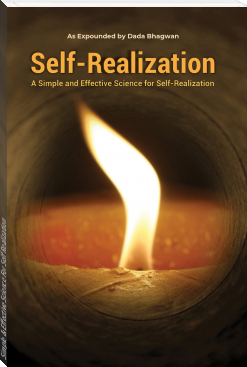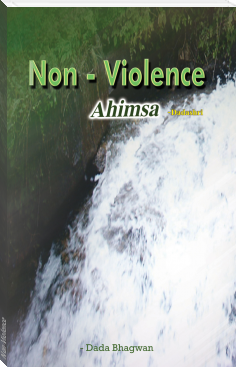Pratikraman: Freedom Through Apology & Repentance by Dada Bhagwan (ink ebook reader .TXT) 📖

- Author: Dada Bhagwan
Book online «Pratikraman: Freedom Through Apology & Repentance by Dada Bhagwan (ink ebook reader .TXT) 📖». Author Dada Bhagwan
It is said that the path of liberation is for the brave and not for cowards, but where must this valor be used to expedite liberation? What is considered cowardice? Is it possible for those with a lot of demerit karma to acquire tremendous merit karma? In what way?
The entire life smolders in the explosive fire; how can it be extinguished? Day and night, under the domination of the wife, tribulations caused by the children, and the havoc of earning money, how can all of this internal burning be relieved and the ocean of worldly life be crossed?
How can spiritual preceptors turn back from the incessant kashay that exist between a guru and a disciple, which lead to a lifetime in hell? For those who commit faults of accumulating money that is not rightfully theirs or faults of illicit sex through the mind, the speech, the conduct, or through a tainted vision, where else would they end up except in a sub-human life-form or a life-form in hell? And how can one become free from that? If one wishes to take heed of that, then how can one take heed and become free from it? What could be the answers to such countless and constantly arising perplexing questions?
Over the course of one’s life, due to the pressure of circumstances, every human being gets caught up in such a situation in which one does not wish to make mistakes in worldly interaction, yet one cannot become free from mistakes. In such circumstances, heartfelt, genuine people constantly experience confusion. For such people, to be rid of the mistakes and to discover the true purpose of living life, through which they can remain in internal happiness and peace, and simultaneously continue to progress, that which one has never received before, the Tirthankars and Gnanis have bestowed the one and only, on the mark, weapon of spiritual Science in the form of alochana-pratikraman-pratyakhyan (three-step process of reversal from hurting another living being through thought, speech, or action). Through such a weapon, the unmanageable, vast tree in the form of mistakes has been uprooted completely, and infinite living beings have become wedded to the invaluable liberation. For the purpose of liberation, that which the manifest Gnani Purush Dada Bhagwan has Seen while remaining in absolute Knowledge (keval Gnan), has been expounded through speech, with exactness and as it is, in [the book] the Science of Pratikraman. All of that has been compiled in the present volume, which will prove to be useful for the purpose of the ultimate liberation of the astute reader.
The speech of the Gnani Purush comes forth based on the physical matter, location, time, inner intent, as well as various other active evidences (nimit). Within the compilation of that speech, considering any shortcomings in the form of seeming errors pardonable, the humble request is to always take in the inner meaning of the speech of the Gnani Purush!
The speech of the Gnani Purush comes forth incidentally for the purpose of closure and inner satisfaction of the spiritual seeker or mahatma (a person who has received Self-realization through Gnan Vidhi) who appears in front of Him. And when that speech is compiled in the form of a volume, it may appear contradictory at times. For example, for the purpose of closure and inner satisfaction of one individual, the Gnani may say, “Pratikraman (to confess, apologize and resolve not to repeat a mistake) is awareness and atikraman (to hurt any other living being through the mind, speech, or body) is discharge.” That is a subjective answer. Whereas for the mahatma with heightened awakened awareness, while providing minute detail, the Gnani may give such clarity as, “Atikraman is discharge, and pratikraman is also discharge. Discharge has to be destroyed with discharge.” Both of these explanations are certainly exact depending on the individual concerned, but they appear to be contradictory from the relative viewpoint. Actually, it is because of the difference in the level of understanding of each individual concerned that there appears to be a contradiction between the two answers. Nevertheless, with regard to the incontrovertible principle (siddhant), there is no contradiction between them at all. Here, the astute reader is beseeched to catch the import of the subtleties of the speech of Knowledge for the purpose of understanding the point.
Dr. Niruben Amin
Pratikraman
1. The True Nature of Pratikraman
Questioner: What is the most important thing a human being should do in this life?
Dadashri: One should speak in accordance with the thoughts in one’s mind, one should act in accordance to that. For whatever you want to say, if there are negative thoughts in your mind, then you should do pratikraman (confess, apologize, and resolve to not repeat a mistake) for that, and for whom should you do pratikraman? Who will you keep as your witness for the pratikraman? You should do pratikraman with Dada Bhagwan as your witness. The person that you see in front of you is not Dada Bhagwan. This is actually a Patel of [a town called] Bhadran, this is A.M. Patel. Dada Bhagwan, the Lord of the fourteen worlds, has manifested within. Therefore, do pratikraman in His name, as follows: ‘Oh Dada Bhagwan, negative thoughts have arisen in my mind, for which I ask for forgiveness. Please forgive me.’ I, too, do pratikraman recalling His name.
(Pg.2)
Carrying out good deeds is considered dharma, and carrying out bad deeds is considered adharma. And to go beyond dharma and adharma is considered Atma dharma (religion of the Self). When you carry out good karma, credit is created, and you will have to come back to enjoy that credit [in the next life]. When you carry out bad karma, debit is created, and you will have to come back to suffer that debit. And where there is no credit and debit in the ledger, the Self is attained.
Questioner: As I have entered this worldly life (sansaar), karma has to be carried out, doesn’t it? What should I do when bad karma ends up being done knowingly or unknowingly?
Dadashri: If it ends up being done, then there would certainly be a solution for it. Always, when bad deeds happen, repentance (pastavo) immediately follows, and you should repent wholeheartedly and with sincerity. Despite repenting, if the mistake is repeated, then do not worry about it. You should repent once again. You are not aware of the science behind this; that is why you may feel that despite repenting, it is not coming to a stop. Why it is not coming to a stop is a science. Therefore, you should simply carry on repenting. For the one who repents wholeheartedly, all his karma are washed away. If someone feels hurt by you, then you should definitely repent over that.
Questioner: Do we have to atone for our routine activities [which lead to hurting other living beings]?
Dadashri: Of course! As long as the awareness of ‘I am the Self’ does not set in, if atonement (prayashchit) does not happen, then more karma gets bound. By atoning, the karmic tubers become lighter. Otherwise, the result of that demerit karma is terrible. One may even forfeit human life [for the next life], and if one ends up as a human [in
(Pg.3)
the next life], then he would face all kinds of difficulties. [Difficulties in obtaining] Food and drink; he would certainly never get any respect. [There would be] Constant insult. That is why this atonement and other rituals need to be carried out. This is referred to as indirect worship (paroksh bhakti). As long as one does not attain Self-realization, it is necessary to engage in indirect worship.
Now, in whose presence should one repent? Who should be the witness for it? Whomever you have faith in. Whether you believe in Lord Krishna or in Dada Bhagwan, whomever you have faith in, do it with Him as a witness. As it is, there is nothing in this world that does not have a solution. The solution is born first, thereafter the ailment arises.
Why has the world come into existence? It is due to atikraman (to hurt any living being through the mind, speech, or body). There is no problem with kraman (neutral worldly interactions or activity of the mind, speech, or body that does not hurt anyone). Say you order something at a restaurant and whilst eating you end up breaking two saucers, so you pay for the damage and then leave; as you have not done any atikraman there, pratikraman does not need to be done for that. But when the saucers break, if you say, “The waiter has broken the saucers,” then it carries on. You have done atikraman, for which pratikraman needs to be done. And atikraman does not refrain from happening, so do pratikraman. Everything else is indeed kraman. Natural and spontaneous conversation is kraman; there is no problem with that. However, atikraman does not refrain from happening. Therefore, do pratikraman for that.
Questioner: How would I myself know that I have done atikraman?
Dadashri: You yourself would know and so would
(Pg.4)
the other person. You would know that there is an effect on the person’s face, and you too would be affected. Both of you would be affected. Therefore, pratikraman must be done for that.
As far as atikraman is concerned, anger, pride, deceit, and greed are all considered atikraman. When pratikraman is donefor that, then anger, pride, deceit, and greed depart. If atikraman happens and you do pratikraman, then anger, pride, deceit, and greed depart.
Worldly life has arisen due to atikraman and it is destroyed through pratikraman.
Questioner: Then what is pratikraman?
Dadashri: Pratikramanmeanswhen the other person is insulting you, you should understand, ‘Who is the one at fault for this insult?’ You should first decide whether the person giving [the insult] is the one at fault or the person suffering is the one at fault. The person giving the insult is not at fault at all; he is not at fault in the slightest. He happens to be a nimit (instrumental in the process)and it is only due to the unfolding of your own karma that you come across this nimit. Therefore, this is indeed your own fault. Now the reason for doing pratikraman is, if you have bad intents for the other person, then pratikraman should be done. If thoughts such as, ‘He is worthless, he is cunning,’ have arisen in the mind, then pratikraman should be done. And if such thoughts have not arisen, and if you consider it as an act of favor, then there





Comments (0)